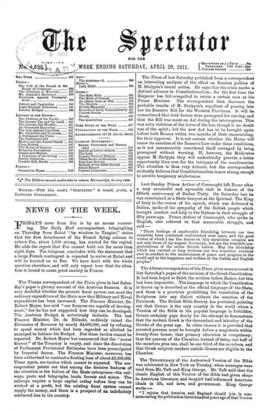The Times of last Saturday published from a correspondent an
interesting analysis of the effect on Russian politics of M. Stolypin's recent action. Ho says that the crisis marks a distinct advance in Constitutionalism ; for the first time the Emperor has felt compelled to retain a certain man as his Prime Minister. The correspondent then discusses the probable results of M. Stolypin's expedient of passing into law his Zemstvo Bill for the Western Provinces. It will be remembered that both houses were prorogued for one day, and that the Bill was made an Act during the interregnum. This was not a violation of the letter of the law, though it no doubt was of the spirit ; but the new Act has to be brought again before both Houses within two months of their reassembling, for their approval. It is not certain whether the Duma will renew its sanction of the Zemstvo Law under these conditions, as it not unreasonably considered itself outraged by being prorogued without warning. If, however, the Moderates oppose M. Stolypin they will undoubtedly provide a better opportunity than ever for the intrigues of the reactionaries. The situation is thus very delicate, but the correspondent evidently believes that Constitutionalism is now strong enough to survive temporary misfortunes.


























































 Previous page
Previous page